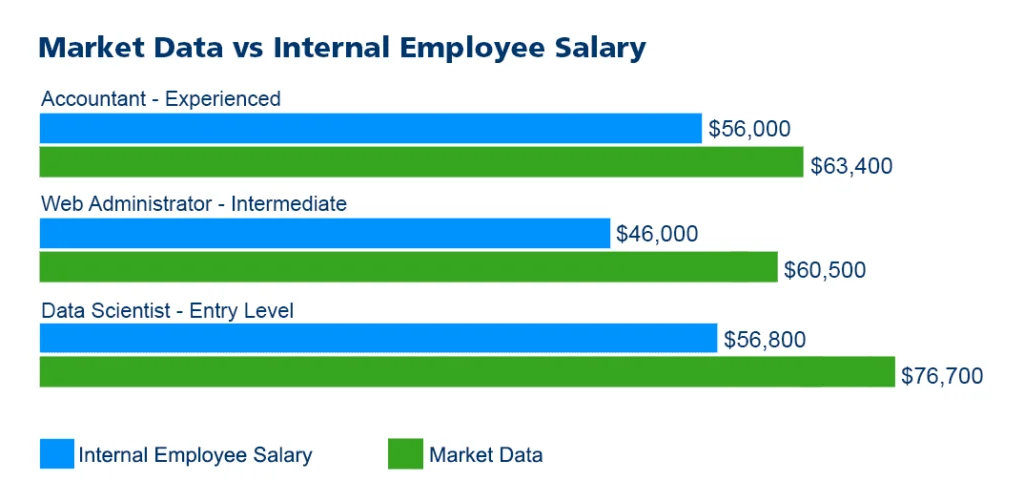
What is salary benchmarking and why is salary benchmarking important?
Salary benchmarking is the process by which compensation professionals match internal positions and their descriptions to similar titles and descriptions in external salary surveys or other sources of market compensation data, to identify the market pay rate for each position. Benchmarking salaries allows companies to stay competitive when it comes to employee salaries and the market salary.
By utilizing internal and external data and understanding what other companies are paying for similar roles, businesses can ensure that they are offering fair wages without overspending on employee compensation.
This article will cover the basics of salary benchmarking and explain how salary data from compensation surveys can be used to help your company establish competitive salaries for your employees. The process of compensation benchmarking can help employers with attracting new candidates, hiring those candidates, and also retaining existing employees.

Top 3 critical points concerning salary benchmarking
- Salary benchmarking helps your organization to ensure that your internal pay rates and internal equity salary adjustments remain competitive within your local pay markets by using comparable benchmarks.
In today's competitive talent landscape, compensation benchmarking allows you to assess how you're positioned relative to the market. This enables you to offer competitive compensation that will help with attracting and retaining talent, all while staying within an appropriate salary budget. Offering fair compensation helps with employee retention, improving poor employee engagement, and helps avoid higher turnover costs due to employee dissatisfaction with their pay structure. Additionally, salary benchmarking data will help establish an appropriate salary range for each position.
- While the salary benchmarking process is a critical part of the annual compensation cycle, it is ultimately only as good as the compensation benchmarking information and the process that you use.
How do you do a salary comparison analysis?
Creating an internal job description is the first step in compensation benchmarking for a new position. It's important to document the key requirements and attributes to conduct accurate market assessments and salary comparisons. By understanding the key attributes of the position you're trying to fill, you can develop a compensation benchmarking strategy for sourcing the salary information necessary to make an informed decision.
Salary Benchmarking Example:

Where can I find market data to be used for good benchmarks?
First, look for a salary source that is relevant to your business and can be used to establish benchmarks. There are many different types of salary sources. Some data sources are free, however, the free sources typically aren't very reliable. The best compensation benchmarking sources are paid, but the value they provide makes up for the cost. The best market data is produced through compensation surveys which collect data about employees' salaries directly from the HR professionals of other companies.
You need data that matches your organization's demographics such as location and industry
You need to find the type of salary information that is best for your business and the role you are trying to fill. If the job is very specialized or in a hot market, you may need to use supplemental salary resources to get an accurate price when comparing salaries. It is advisable to use average salary data that is related to the geographic location and sector of your business. A good example of this is our Real Estate Salary Survey which allows an employer to create custom industry-specific reports.

Participate in our Real Estate Salary Survey
How do I know if I have good comparison data for the salary benchmarking process?
When comparing job titles and descriptions, it's important to find the best match. This will help you establish accuracy with salary benchmarking.
There are many factors to consider when finding a match, such as the skills required and the job responsibilities involved. However, similarities in job titles can be a good indicator of a good salary match.
Some of the best compensation benchmarking jobs for your company might include roles with similar titles in your market data. By finding a good external salary match, you can use the corresponding salary information to set salary ranges for your role, including minimum and maximum salaries.
Salary benchmarking tips from the pros
Many different data sources of compensation information can be used for competitive salary benchmarking. These come at a range of costs and price points, so be sure to find one that fits your budget. The most important factor is that the salary sources cover the same positions, career levels, industries, geographic locations, company size, and components that you can compare to your organization. This will ensure that your researched compensation data is accurate, and competitive, and can be used when your HR teams benchmark your employee population.

Don't stress about internal job descriptions that aren't an exact match
Job descriptions can be tricky. You want to make sure that the job descriptions match the content of your internal job descriptions, but you don't need them to be a perfect match. To find the right match, look for a benchmark job description whose content matches 80% or more of the content of your internal description.
Job Matching should be based on the job description, not solely on the job titles
Job Matching should be based on the job description, not just the job title. While this may take time, it is worth the extra effort. Different names for similar titles can be confusing, so it's important to rely on the job description to find your closest benchmark job match.

Utilize compensation benchmarking to help you price harder to find specialty roles
Benchmarking jobs are those that are common in most companies and have been established as a standard for comparison. Examples would be common titles in Human Resources or Accounting. For example, HR Managers and Information Technology Managers are fairly common roles at almost any size employer around the world. They can be used to help price other roles, and can also give you an idea of what the market is willing to pay for certain types of work.
There are several different ways to use benchmarking jobs for your employees. One popular method is slotting. Slotting takes a role that is relatively easy to price and compares it to other positions to create a range. This range can then be used for other, harder-to-price roles.
Be careful when combining multiple positions to create a new position used for compensation benchmarking
When it comes to job matching and salary benchmarking, it's important to be careful. Compensation consultants will often combine two or more roles to create a customized job that's not always accurate.
A common compensation philosophy is to limit the number of rolled-together positions to three or fewer.
Remember, when you analyze data you're looking for an 80% or better match
, which you can then use to set competitive salary range, or pay range, for your roles. These set pay ranges will be reflective of the market value and adhere to current market trends for each job position.

Why should companies benchmark their salary range?
Having a complete compensation package for your employees is crucial. From managers to entry-level, salary benchmarking can be used for setting a budget, hiring talent at the right labor costs, staying competitive, and attracting the right candidates. When employers are setting salary benchmarks, it's important to use salary data that is relevant to your company, location, and industry. This will ensure that as an employer, you are accurately setting an effective compensation strategy for what each employee is paid. Employees respond well knowing their pay levels reflect the market averages and going market rate for similar jobs.
How do you evaluate salary? The answer is simple. For each title, salaries should be benchmarked against salary data that aligns with your company's competitors, related products, employees, and labor market. This way you are utilizing reliable benchmarks from other companies to ensure accuracy when determining appropriate pay ranges and merit increases.

What are compensation benchmarking best practices?
It is important to remember that no compensation strategy fits every company or business model. There isn't a salary benchmarking template or salary benchmarking format that is right for everyone. Each organization will have different reasons for setting salaries, merit increases and profit sharing the way they do.
At the end of the day, compensation strategy is about setting appropriate compensation expectations for each employee based on their job role and experience. It's about hiring the best talent and rewarding top performers while retaining valuable team members that will help you reach company goals and objectives.

Properly organized and implemented, compensation strategies that begin with setting salary benchmarks will help each employee understand what they can expect in terms of compensation packages. This will create trust between the company and its team members, which leads to a stronger work ethic and better employee morale. Additionally, if you follow these best compensation practices revolving around market rates, it will help control labor costs, assist with setting a budget, allow you to accurately price a position in your company, and improve employee performance with competitive pay.
These salary benchmarking best practices ensure your compensation plan is competitive and fair for your location and industry. It will also be a helpful and effective resource for your hiring managers to use when negotiating offers and setting job postings.
Our goal is to provide you with a solid understanding. We encourage you to explore and expand your compensation knowledge by reading our other articles found in our Academy resource. Also, to learn about our compensation data, how much an external compensation study will cost, and how it can be used as benchmarks for your global salary benchmarking analysis, please browse our salary software resources, and blog articles, and sign up to view an example compensation report for free.

Search no further, we have the specific compensation tools and resources you need for your HR team and employees at a lower cost than many providers. From the United States to London, to all over the world, our new and flexible tools are the first choice for many human resources professionals. Our customer service provides a personal experience and will offer you added value to improve your competitive pricing strategies across the board. Sign up today!
Salary of a Property Manager in the United States
Property management is a demanding job that requires a lot of experience and knowledge to succeed

How to get the best data on real estate development salaries?
Two of the main methods are aggregated salary sources and compensation surveys
